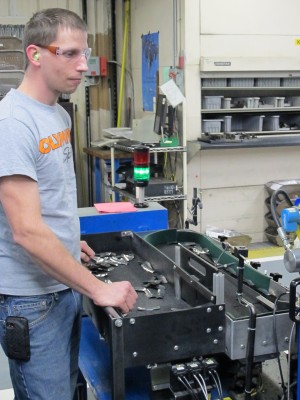Q&A: Why NH Factories Are Struggling To Find Workers (And What The Community College System Is Doing About It)

Community College System Of New Hampshire
Community College Chancellor Ross Gittell breaks delves into the skills gap issue
As the national economy continues to trudge toward recovery, the Obama Administration has been pushing advanced manufacturing as a key driver for jobs growth. So over the past couple of weeks, we’ve been looking at various aspects of manufacturing in New Hampshire. While the sector historically struggled in the transition from mill work to high-tech fabrication, today, manufacturing is thriving in the Granite State.
But to continue on a sustainable path, the sector faces one daunting challenge: The so-called “skills gap.”
In many of the state’s factories, the bulk of advanced machining and other skilled work is done by Baby Boomers, who are rapidly moving toward retirement age. And community colleges aren’t turning out enough graduates with the skills to replace them.
Recently, we sat down with new Community College System Chancellor–and economist–Ross Gittell to discuss the depth of this problem, and how he hopes the state’s trade schools can solve it.
Q: Can you describe what the skills gap issue means for New Hampshire’s economy?
A: It’s particularly relevant as the economy nationally, and particularly in NH, starts to gain momentum. From the Great Recession of 2008-2009, there’s been relatively weak employment recovery, and at this moment, there’s now some acceleration in that recovery, particularly in some areas related to advanced manufacturing. A key issue for advanced manufacturers is where they’re going to expand their operations. And they’re going to expand their operations where there’s the appropriately skilled workforce available…So, if New Hampshire is able to have that appropriately skilled workforce, there’s an opportunity to grow employment.
Q: Do we have that workforce set and ready to go right now?

Amanda Loder / StateImpact New Hampshire
Young workers are a commodity at advanced manufacturing firms like GE Aviation in Hooksett
A: Yes and no. We do have a strong skilled workforce foundation, with engineering and science and technology-orientation. But some of the skills needed in automation and process control and programming, robotics, and numerical systems in manufacturing, those are really particular skills that we need to train, particularly, our younger workers in…We’re well-positioned with the Community College System to provide that type of advanced manufacturing training in a relatively short period of time, and get those workers placed in these businesses and industries that are expanding. But what that requires is a close alignment of our educational institutions, including the Community College System, with those needs of industry. And we really have good alignment between education and industry currently, but we need to strengthen that…because this is our opportunity, really, to expand our advanced manufacturing, which we haven’t in the state for arguably a decade.
Q: What would this expanded cooperation look like, ideally?
A: The expanded cooperation would be to take this to scale. To not just say, “Oh, we’re going to do this program for one industry, for GE Aviation or for Albany Engineered Composites, or for Osram Sylvania,” but to say, “Ok, we have these large numbers of advanced manufacturers with similar type of workforce needs, and how do we develop state-of-the-art, high-quality educational programs in the areas needed by advanced manufacturing? And how do we provide the appropriate curriculum, the appropriate program, the appropriate degrees, both in courses, online, and also through experiential learning, on scale, so that we provide a well-qualified workforce for advanced manufacturing, not only now, but also well into the future?”
Q: It sounds like, the way the Community College System works is a company will reach out to you and say, “Hey, we need people qualified to machine these specific parts,” and there’s not a set advanced manufacturing curriculum?
A: Yeah, but actually, we’re developing that set curriculum across the seven colleges…We’ve gotten [a $20 million]* Department of Labor grant, we’re using that for our Ramp-Up program, which is to ramp-up manufacturing. It’s based at Great Bay Community College and focused on Albany Engineered Composites. And then we’re going to take that experience and spread it across our seven colleges. And our seven colleges each have advanced manufacturers who they’re working with…So we are going to be able to bring this to scale.”

Pete Ashton / Flickr
As Baby Boomers move out of the manufacturing workforce, there might not be enough Gen Y laborers to replace them
Q: One of the issues we’ve heard about is that it’s particularly hard to get current, Gen Y students interested in manufacturing. Why do you think that is?
A: Because so long, manufacturing in the United States and in New Hampshire was in decline, and people were saying, “Manufacturing’s never coming back,” and “There’s no good jobs in manufacturing.” Manufacturing’s been reinvented in the country and in New Hampshire. It’s very different than it was 20 years ago. The manufacturing that has remained in New Hampshire is advanced manufacturing, which requires high-technology. It’s highly automated, and the workers in that industry have to be very skilled and capable in automation and problem-solving in the manufacturing process.
Q: So do you think it’s going to be a hard sell for community college students to get into this?
A: I think it’s less of a hard sell when this is the economic opportunity for them. And a lot of times, students have a range of interests, and if they see there’s a good job opportunity in something that interests them, they’ll move more strongly in that direction. So I think getting that message out and having real opportunities for gainful employment in advanced manufacturing will move more of our students towards that area. There’s always a lag between where the workforce opportunity is and where students think it is. And now, there’s that lag in students catching up.
Q: What’s the scope of the skills gap issue? Are we talking hundreds of open jobs right now in New Hampshire that we just can’t fill?
A: I think we’re talking in the multiple thousands. Because we just had 400 jobs in advanced manufacturing created over a three, four-year period. Saffron and Albany Engineered Composites, we hear from other advanced manufacturers that they could fill 50, 100 jobs if there was the appropriately skilled workers. And those numbers add up. I mean, maybe in the short-term, there are a couple of thousand. Over the long-term, if we demonstrate in New Hampshire that we have a very well-skilled advanced manufacturing workforce, we’re going to be able to grow the companies that are here in advanced manufacturing, and also attract companies from the outside, whether they be US-based companies or foreign-based companies.
Q: Is there anything that’s holding New Hampshire back in terms of ramping-up this high-tech manufacturing workforce?
A: Well, part of it is, you know, our resources at the Community College System. We just recently had a 20 percent cutback in funding…our need-based scholarship money was cut. So students who do want to go into these areas sometimes have a difficult time paying the up-front tuition costs, and so the jobs are there, the needs are there…So we have to kind of fill those gaps, those market failures, and give more support to those students. And public funding could help the interests of our students, but more important, for the public funding concerns, increase our economic competitiveness and growth over time.
Q: And what happens to New Hampshire’s economy if we can’t get ourselves in gear and get this workforce trained-up and ready to go?
A: Then we’re in a slower growth economy, as far as recovery of jobs lost during the recession. And the recovery will be of the nature that it won’t include as well-paying jobs as it will if we recovery with these advanced manufacturing jobs.
*Jamie Webben of Seacoastonline.com reported on the grant award last fall: “Nearly $20 million of the nationwide total was awarded to New Hampshire community colleges…Great Bay Community College in Portsmouth, N.H., which partnered with Albany International and other New Hampshire manufacturing businesses for the grant, is expecting to receive approximately $6.2 million…”



